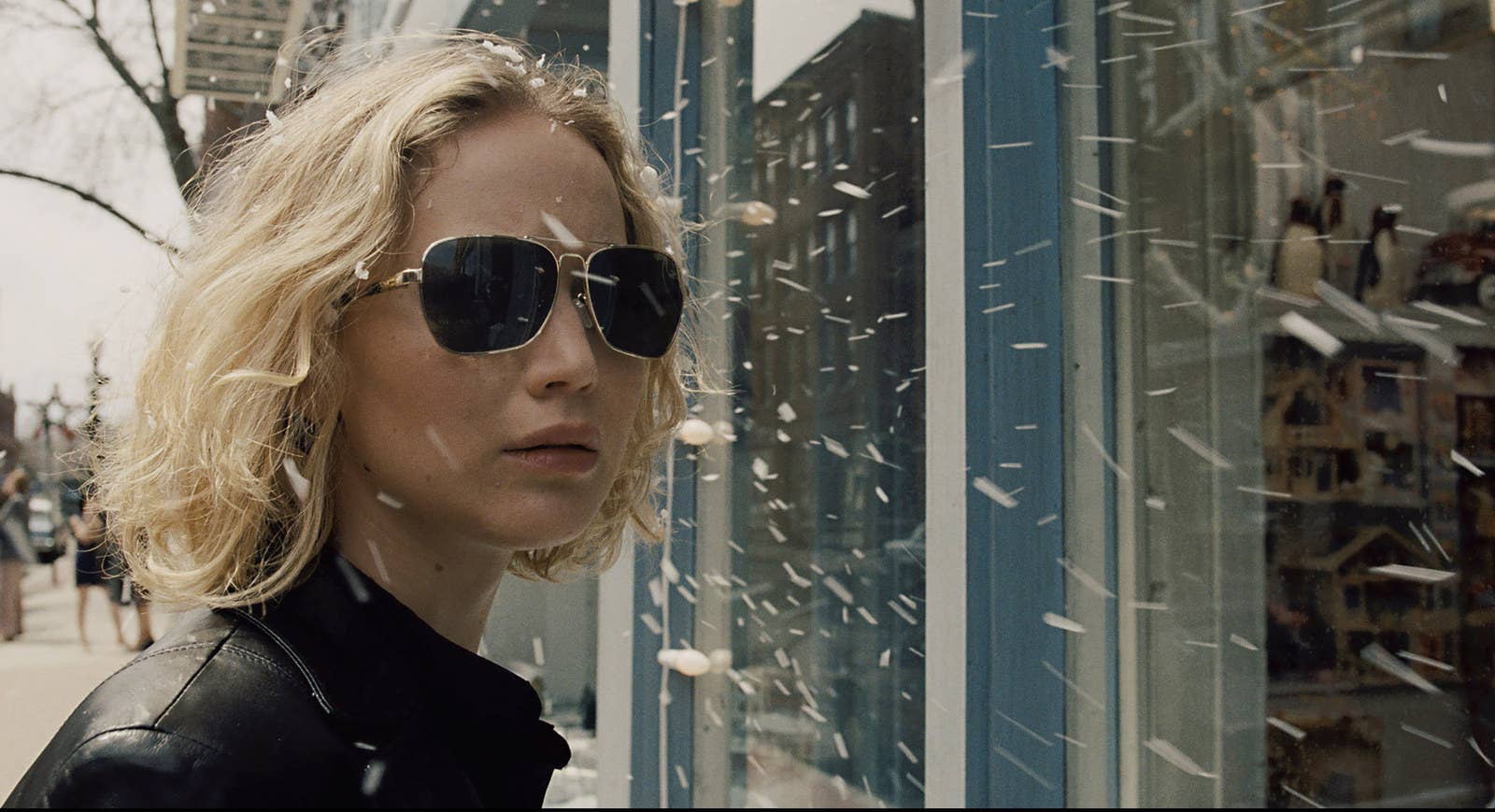
More than halfway through David O. Russell's Joy, there is a scene that demonstrates what the movie might have been. The beleaguered title character, played by Jennifer Lawrence, has stormed into QVC headquarters in Pennsylvania to sell her own damn mop on the air after a salesman couldn't manage to demonstrate it correctly and sold none of them. It's not quite life or death for Joy — who supports her two young kids and her depressed, bedbound mother — but it's close. She has gone into debt to manufacture 50,000 mops, and if she can't make this work, she will end up in foreclosure and bankruptcy.
It's the sort of scene audiences have watched and loved dozens of times in underdog movies: She faces down QVC's Neil Walker (Bradley Cooper), who tells her that she can't sell the mop herself, that they don't have "regular people" do the selling. Joy counters, "Who sold you the mop? Who sold it to you?" Neil doesn't take that much convincing, and soon Joy finds herself under bright lights on live television, frozen in fear. "Sorry, these lights — so bright," she finally says. She blathers on, flailing.
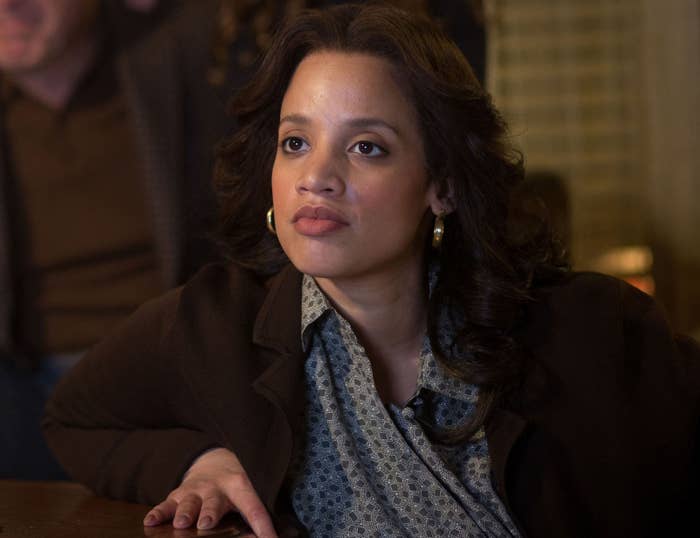
Then a "friendly call" comes in from Joanne in New York. As soon as the caller begins talking, Joy's face registers recognition and comfort: It's her best friend, Jackie (Dascha Polanco), verbally cueing Joy to sell the mop to her, someone she knows and loves.
"When I mop broken glass, and I wring the mop, I cut my hands," Jackie says, as we see that she's calling from Joy's living room. Suddenly, Joy comes back to herself and is at ease. She starts to wag her finger with charming authority, smiles, and says through her nose in a Long Island–infused twang, "Joanne, that is so funny that you said that, that is actually how I was inspired to invent this mop." The film score kicks in, signifying that we can relax.
Neil realizes that Joy is a natural. The QVC phones ring, and Joy keeps selling. "This woman's gonna be a whole new business," Neil says to himself as the segment ends. But even he is shocked when the sales counter speeds past 47,000 mops sold. Joy, overcome, cries. It’s a nerve-racking, exciting, moving, well-paced, dynamically acted scene, and it's showing us a world we've never seen before.
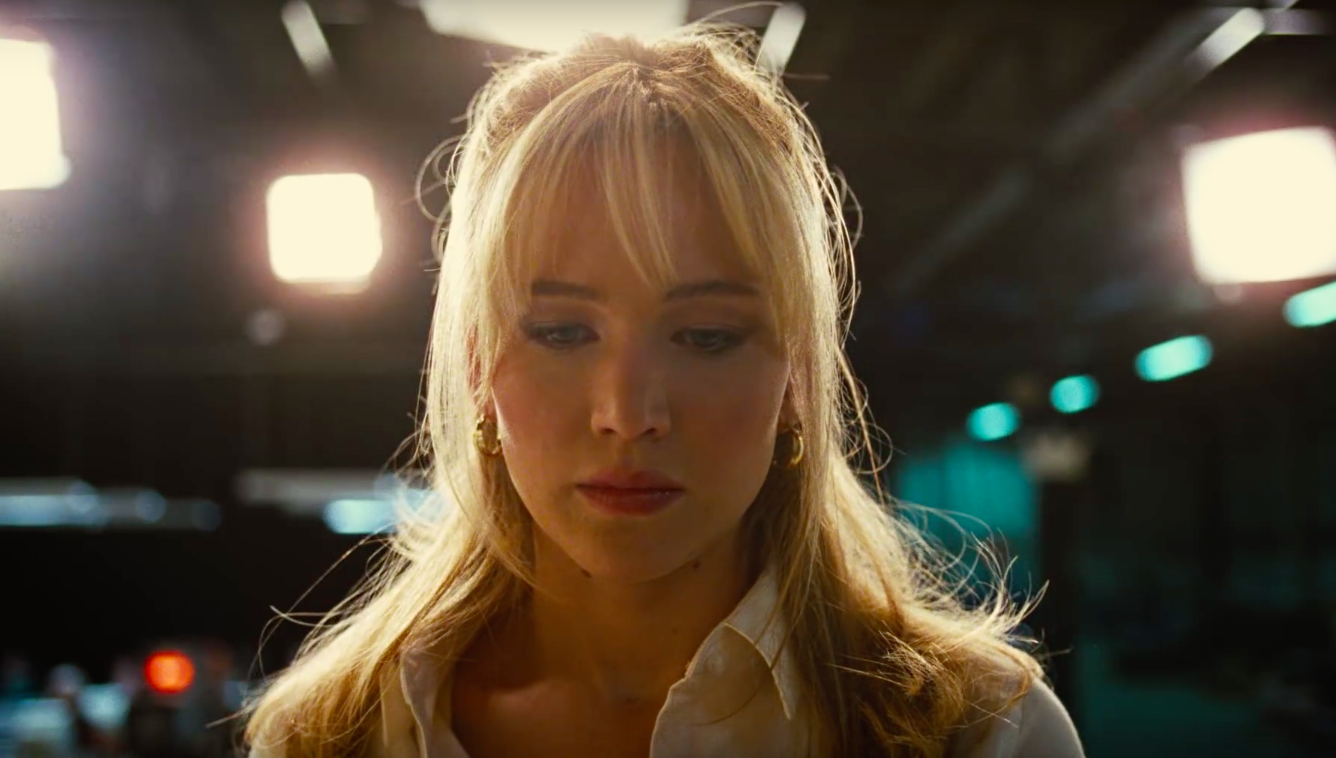
Joy is the story of a woman. And it was originally meant to be about a specific woman: Joy Mangano, the inventor of the Miracle Mop, a divorced mother of three who went from near financial ruin to home-shopping stardom. To tell that story, according to The Hollywood Reporter, producers Ken Mok and John Davis, who had bought Mangano's life rights and sold the movie idea to Fox, hired Bridesmaids screenwriter Annie Mumolo to write Joy. (Along the way, Kristen Wiig, Mumolo's partner in Bridesmaids, became loosely attached to play the main character.)
From there, Joy's authorship becomes muddy. Both The Hollywood Reporter and Vanity Fair reported that Fox 2000's president, Elizabeth Gabler, didn't feel Mumolo's script was strong enough, so she and the producers brought in David O. Russell. He signed on — and then brought on Lawrence, displacing Wiig — based on Mumolo's draft. But Gabler told Vanity Fair that Russell started from scratch: "He didn't rewrite her screenplay.”
Nevertheless, a Writers Guild of America arbitration didn't see it that way. Though Russell received sole screenwriting credit, the WGA dictated that he and Mumolo would share story credit, with her name appearing first.
Something strange seemed to have happened. As early as the release of Joy's first images last July, Russell told Entertainment Weekly that he wanted to do "an epic, unexpected story about the interior life of one woman’s soul, from the ages of 10 to 40." Yes, he was inspired by Joy Mangano's story, but also, in EW's words, by "the personal female influences of his youth, including his mother and her circle of friends."
Perhaps there were fears that a $60 million movie about a woman who had invented a mop — even one played by Lawrence — was a risk. But also, there are tricks to winning WGA arbitrations so the arbitrators will rule that Screenwriter A wrote the bulk of, or all of, a film, versus Screenwriter B. There's rewriting dialogue and scenes, of course, but there is also the strategy of adding characters, and changing existing characters' names.
If trickery is why Mangano's last name doesn't end up in Joy at all, or why the audience never hears the name "Miracle Mop," it seems like a far distance to travel for writing credit — and one that is a clear disservice to the audience. Yet if there is a logical reason why a movie about a blonde, divorced Long Island mother named Joy who invented a miraculous mop isn't meant to be Joy Mangano — in a movie executive produced by Joy Mangano — no one has articulated it in the press.
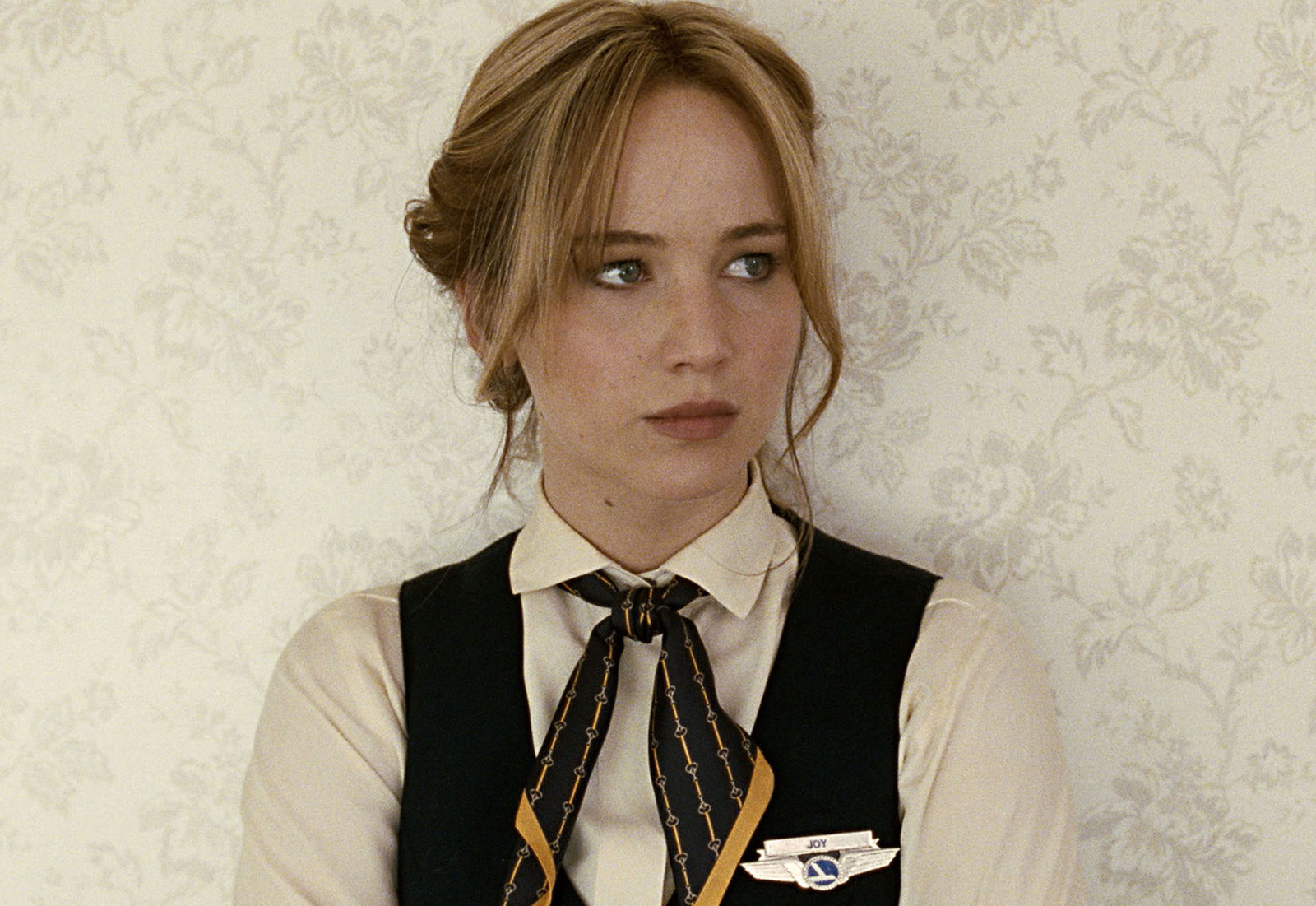
BuzzFeed News has obtained a copy of Mumolo's version of Joy, and it is indeed different from Russell's. As a straightforward, funny biopic of Mangano, the story begins with that scene of Joy about to try to sell her mop on television for the first time — she's "paralyzed with fear," the stage notes say. It then flashes back to her wedding, and takes the story through her divorce, her invention of the Miracle Mop, her on-air sales coup, and the rookie mistakes that almost brought her burgeoning empire down before she could build it. It ends with Joy victorious, but humane, poised to continue her ascent, flanked by her ex-husband, best friend, and kids.
We will never know whether Mumolo's version of Joy would have worked. In critiquing it in Vanity Fair, Gabler said, "I felt like it needed to be much more about Joy’s journey, not just about the creation of the mop and all the details that were involved with the mop. It needed to be much more of an emotional and all-encompassing story."
If the story of inventing a mop ultimately feels small or domestic or otherwise inconsequential, of course that could have been true. Then again, maybe that's an intrinsically fucked-up view of how we belittle women's stories when we can easily watch Mark Zuckerberg talk about Facebook in The Social Network or Don Draper think up ads for seven seasons on Mad Men without wondering whether men's creations are big enough to be worthy of our attention.
As a filmmaker, Russell is ambitious and divisive, and Joy isn't the first time he's battled with a screenwriter over credit. With 1999's Three Kings, he wrested sole screenwriting credit from John Ridley, the original writer, who ended up with story credit. On American Hustle, Russell rewrote Eric Warren Singer's screenplay, and the two ended up sharing credit on it.
Such things are irrelevant to the pleasure or pain of watching a film, of course. But in this case, Russell's Joy contains some inexplicable, ill-conceived, and even silly turns. And in Mumolo's screenplay, those indulgences aren't there. Let's look at the the most shocking differences between the two versions.
1. Russell created the magical realist framing device of a fictional soap opera.
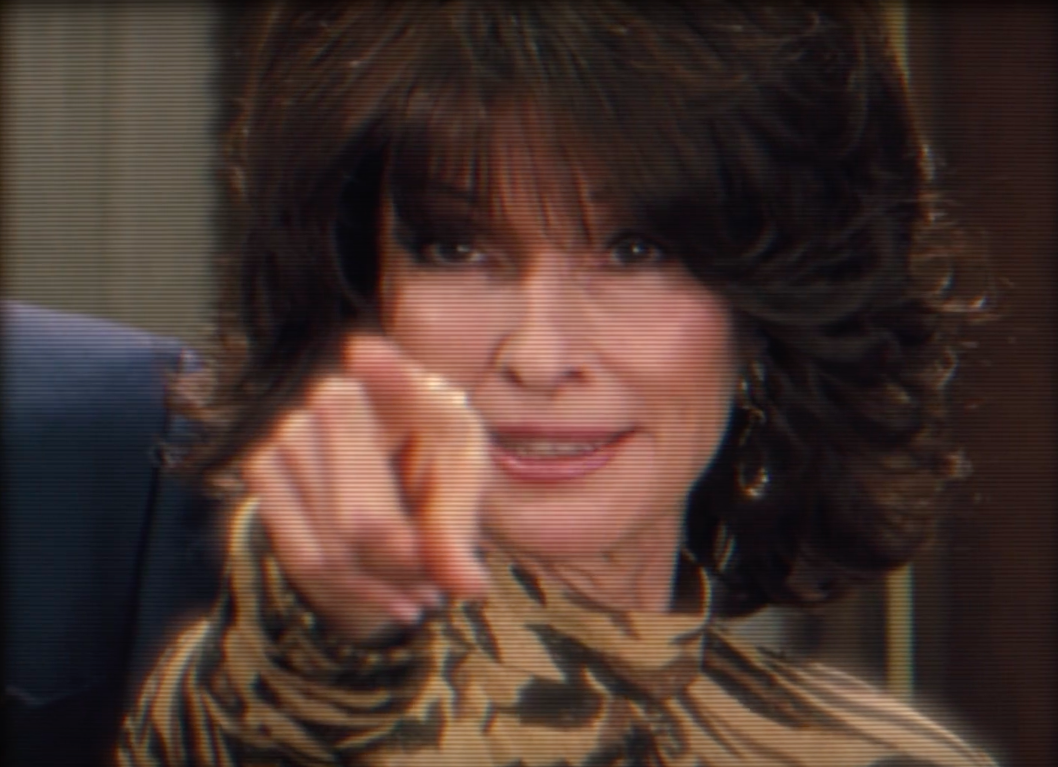
The opening shot of Joy is a black-and-white soap opera. Two women (played by soap actors Susan Lucci and Laura Wright) stand before a fireplace in a prototypical rich-person house. They face each other in a static wide shot, and the camera feels too far away for a soap — but the whole thing feels like a parody anyway, as Lucci's Danica hands Wright's Clarinda a gun and says, "When someone sees a weakness in me, I turn the weakness into a strength." The scene continues, a soap opera pastiche of overacting, stiff acting, and flat dialogue. Then Cream's "I Feel Free" begins to play, the screen goes black, and the words "Inspired by the true stories of daring women" appear — followed by the words "one in particular."
The soap opera that weaves its way through Joy's story is the one watched by her emotionally paralyzed mother, Terry (Virginia Madsen). Terry, who will barely get out of bed, lives vicariously through her show — she is the opposite of Joy, who can't stop working, providing, fixing, and at one time in her life, inventing. During one scene, Joy lies down in the bed with Terry and her two small children, and says, "I feel like I'm in a prison." Terry, who never really hears her daughter, says, "No, Bartholomew is the ex-con in the story, and Clarinda doesn't even know about it…" as Joy falls asleep.
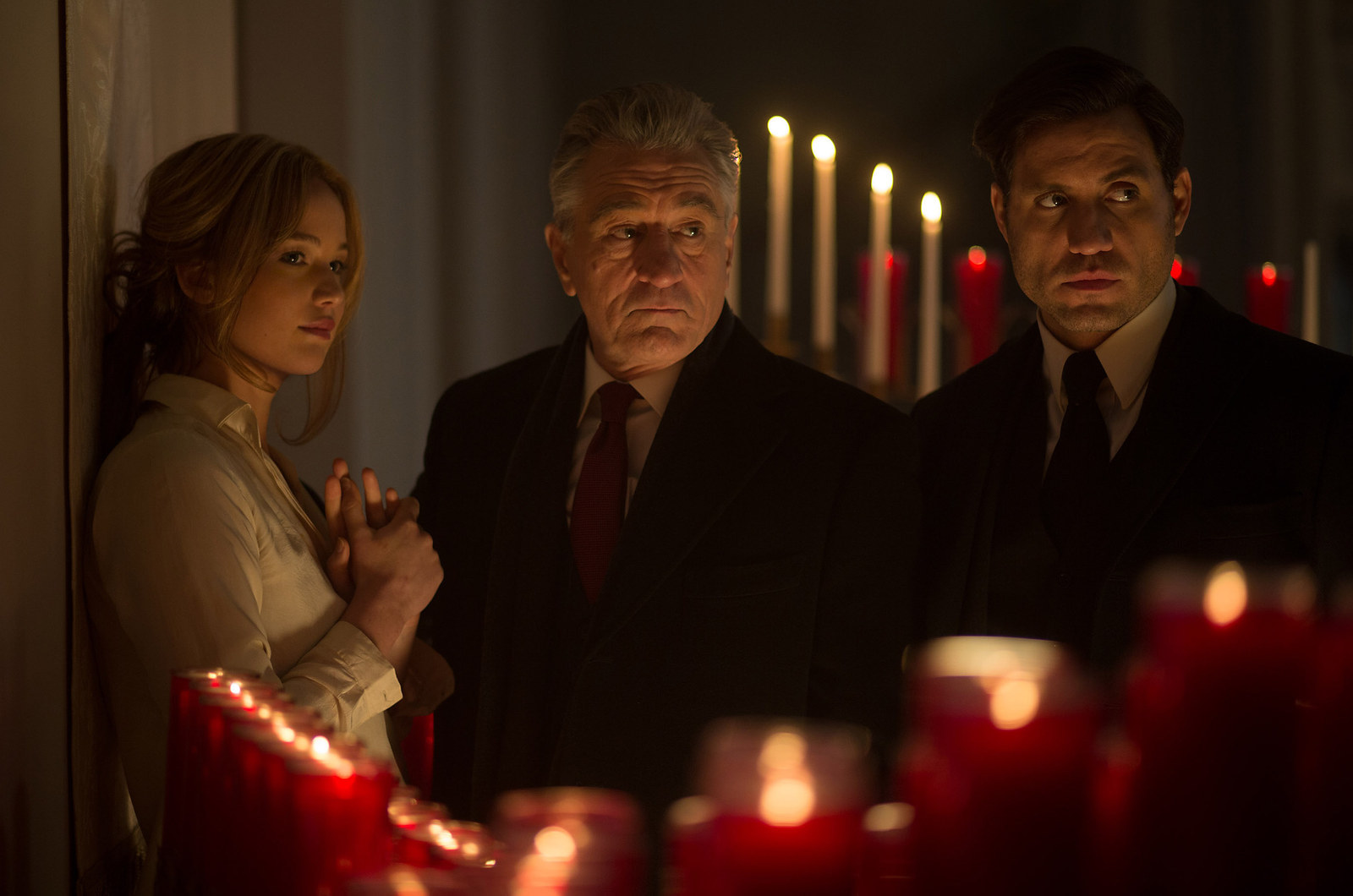
Joy then dreams that she is in the soap opera, frightened and pressing herself against a wall. Terry; her father, Rudy (Robert De Niro); her half-sister, Peggy (Elisabeth Röhm); and her ex-husband, Tony (Edgar Ramirez) are among the soap's cast, cornering Joy and taking her to a funeral for her 10-year-old self: We see Joy's parents argue and discuss divorce, dashing one of Joy's projects in the process.
In waking life, things are about to change for Joy, as she soon gets the idea for the mop after she tries to clean up a spilled, broken glass of red wine and cuts her hands bloody while wringing out a non-miraculous mop. But not before she has another soap opera dream, one in which her 10-year-old self (Isabella Crovetti-Cramp) reappears to address Tony, Rudy, Terry, Peggy, 27-year-old Joy, and Trudy, her father's new girlfriend (Isabella Rossellini). "Seventeen years," says young Joy resolutely. "Think about it. We've been hiding for 17 years. Seventeen years. We used to make things 17 years ago. Then that all stopped. What happened?" Little Joy directly addresses current Joy, and says: "When you're hiding, you're safe, because people can't see you. But funny thing about hiding — you're even hidden from yourself."
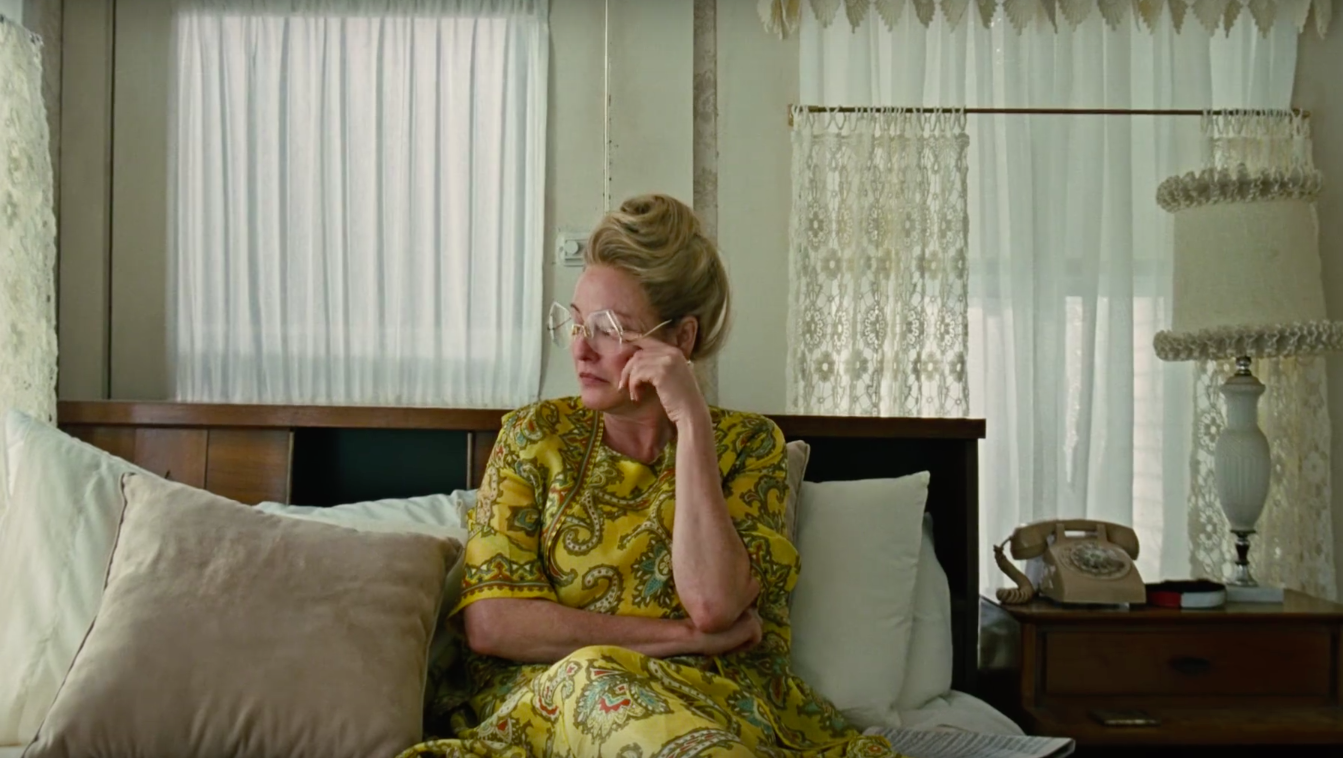
None of this works, and none of it is in Mumulo’s script. There is no suggestion that soap operas — entertainment traditionally created for women — are oppressive or haunting or nightmarish. And in Mumolo's script, Joy's mother — named Toots (Mangano's mother's nickname) — watches Home Shopping Network, not soap operas. Toots is annoying and selfish, but not pathologically bedridden and delusional like Russell's Terry, a character who seems like she has wandered in from a John Waters movie. She babysits Joy's kids as she indulges in her home-shopping addiction, but it's this repeated irritation on Joy's part that gives her the idea to call HSN to submit the mop to be sold on the air.
(In Russell's screenplay, Joy humiliates herself trying to sell the mop in a Kmart parking lot, nearly getting arrested in front of her daughter and Tony, who is with his new girlfriend. After this scene, Tony has the idea that they go to QVC because he has a friend who works there — it hasn't occurred to Joy that home shopping might be an option for her.)
One of Joy's main problems is its tone: specifically that Lawrence's grounded, capable Joy is in one movie, and nearly everyone else is in other movies (and not all the same other movie, unfortunately). But of all the head-scratching choices, a soap opera spine in combination with soap opera–inspired dreams in which inner children appear to give speeches is one that, under the best of circumstances, feels like a narrative impossibility.
2. Russell also added the grating wise, young Joy.
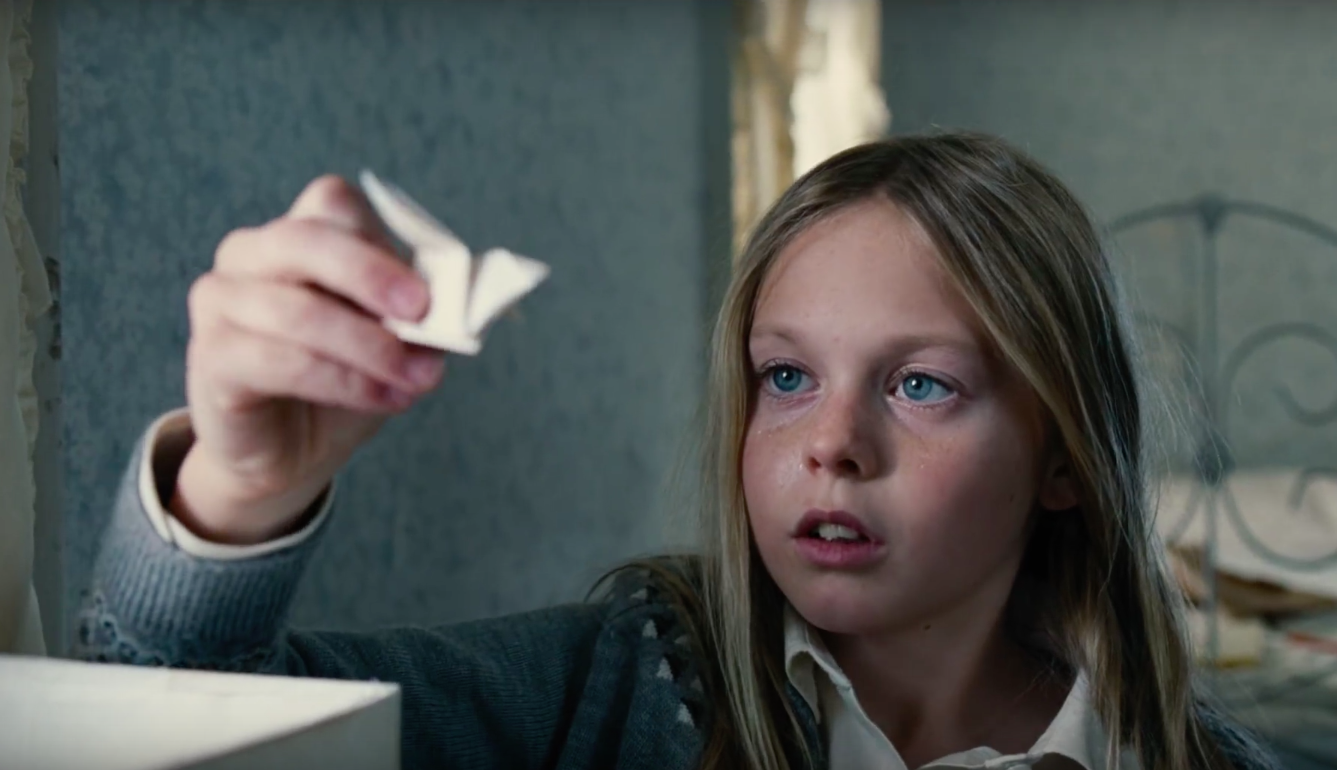
Joy has a complicated ending (and more on this later) that involves voiceover from the dead and a flash-forward 15 years into the future. In the future, we see Joy moving into a new, large house and — as in the first scene of The Godfather — sitting in a dark office behind a large wooden desk, in a leather chair, and receiving visitors.
She finds a shoebox at her feet, opens it, and pulls out a paper picket fence we saw Joy make toward the beginning of the movie — and then we hear the voice of young Joy, repeating what she said to Peggy during that early scene: "This right here, this is a special power." The scene intercuts between current Joy remembering and 10-year-old Joy's imaginings. "This is a special power. And then I started to build my very own house where I would live and make wonderful creations for all the world to see and love." As she looks at a paper Christmas tree also from the box, Joy's eyes fill with tears — she has realized that dream, duh. She starts to smile, deeply satisfied. Once again, Cream's "I Feel Free" begins to play.
In Mumolo's screenplay, there are no wise children. There is no harping on the idea that Joy, an adult woman in her thirties (the character was aged down to 27 for Lawrence) had to return to her childlike imagination in order to thrive. In the Mumolo version, Joy gets the idea for the Miracle Mop as she works at a diner where she has to mop after her night shift; she not only has the gross experience of wringing it out with her hands, but slips and falls from the effort. Throughout Mumolo’s screenplay, Joy is often cleaning, but she also hasn't lost any sense of entrepreneurial or inventive drive: In addition to her jobs, she makes wreaths at home and then sells them to a florist based on her ability to talk to people and win them over.
3. Joy's announcement that she doesn't "need a prince" is more stated than felt onscreen.
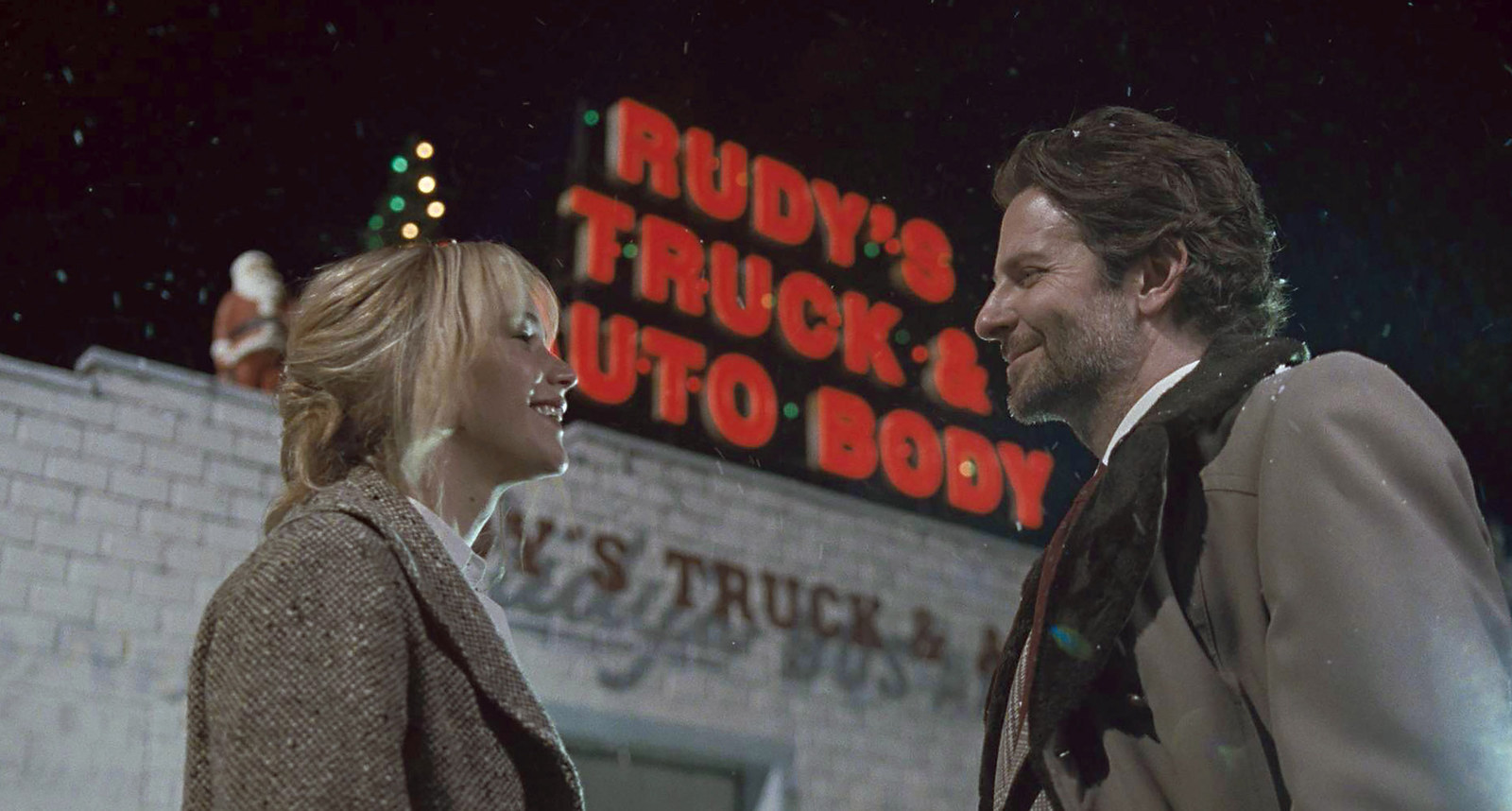
Joy clearly announces its stance from the character's introduction in the scene when she is 10, building the paper structures that her later self finds in the box at the end. She wants to "make wonderful creations for all the world to see and have." In her mind, the prince and princess, who live nearby, are her customers. "And maybe they'd invite me over because of the things that I made." The teenage Peggy, to whom Joy is describing this idea, says: "You need a handsome prince. That's what you need. A prince." Joy disagrees in the strongest terms: "No, I don't need a prince. This is a special power — I don't need a prince." (Children repeat phrases a lot in Joy.)
With this idea stated so soon and so distinctly in the movie, it's easy to see why Justin Chang of Variety would interpret Joy as having "feminist underpinnings." (Though BuzzFeed News' Alison Willmore certainly did not.) There isn't a romance for Joy in the story, which is rare for a story about a woman — and welcome. Yet it grows tiring how often we're meant to see Joy's worth only once Neil — who is surely the most mansplainy character in popular culture in recent years — sees it. Whether that's when Joy first convinces him to give the mop a chance at QVC, or when he lets her sell it herself, or in the final scene in the movie when his benediction — "I'm proud of you" — is framed as her final achievement.
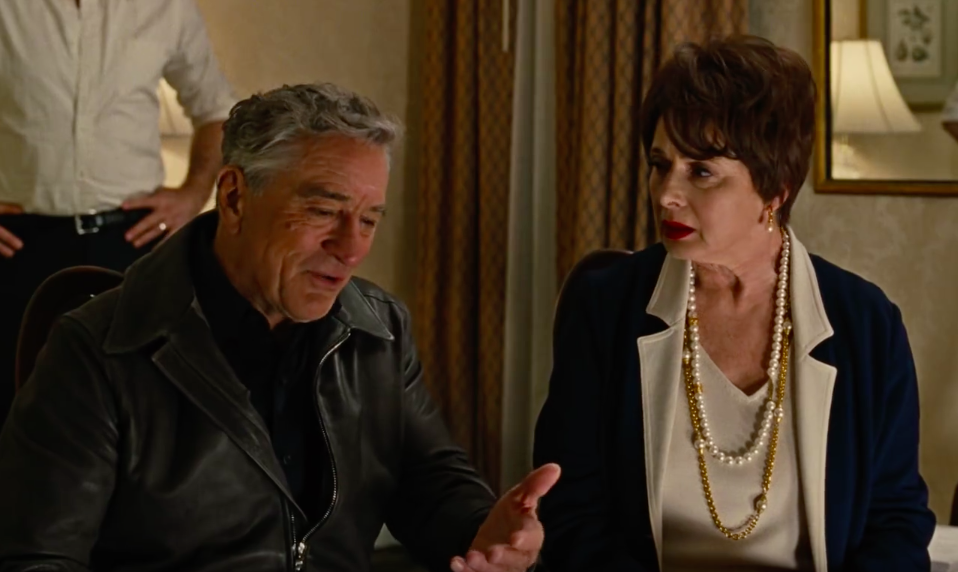
Unpleasantly, Neil's praise is mirrored by Joy's father's belittlement. After Joy has flown to Los Angeles to negotiate with the factory Rudy and Trudy found to make the parts for the mops, she is arrested for trying to take her molds back from these shady people who are ripping her off. Then, in a whipsawing scene that can't decide whether it's comic or tragic, she is confronted by Rudy and Trudy. For no logical reason, Trudy, who lent Joy the money to start her business, says she has to declare bankruptcy: "I predicted tragedy, Joy," she scolds. Then, Rudy says, in front of Joy's daughter, "It's my fault. I gave her the confidence to think she was more than just an unemployed housewife selling plastic kitchen stuff to other unemployed housewives on a junk cable channel."
Here, we are meant to believe that his half-deranged lashing out resonates with Joy, because she ends up parroting his words to her tiny daughter. "The world will not give you opportunities, the world will destroy your opportunities and break your heart," she yells at Christy (Aundrea and Gia Gadsby). "I should have spent the rest of my life watching TV and hiding from the world like my mother."
When everyone leaves Joy alone at the end of this scene, it pivots to her researching the shadowy businesspeople she is shackled to, and finding her way out of this mess. (But not before she looks in the mirror and cuts her own hair: like Joy of Arc? G.I. Joy? Felicity Season 2?) She flies to Dallas and has a meeting in a hotel with the man who has been holding her business hostage. In Russell's description, he is called only "Dallas Man," and he wears a cowboy hat. At this point in the story, it's hard to understand exactly what has happened — but Joy dispenses with this Coen brothers character quickly and frees herself from him forever.
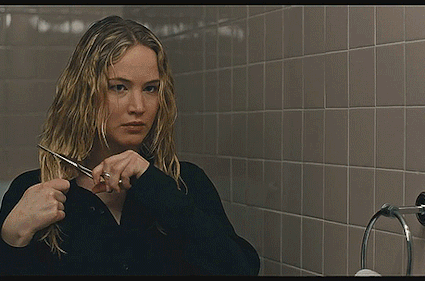

So it's a surprise to see in Russell's version that after her moment of triumph, Joy pauses outside of a toy store window under a snow machine — a visual callback to an earlier romantic scene with Tony — where she watches with regret, as his screenplay reads, "a happy intact family" with "a little girl, two parents." Russell writes, "She is sad inside." Because of her divorce? Because her father sucks? Because she screamed at her small child? (It's not that last one, but if Joy should feel sad about anything, it is that.)
Mumolo's story also has Joy betrayed by her father. Only here, it’s because Rudy, who is mob-adjacent and in debt, has given Joy's patent and the manufacturing contract to a criminal named Matty the Horse. The final showdown takes place in court, with her father siding against her and claiming he invented the mop; Joy asks him to use the mop, and he can't, so it's clear he's lying. She directs her anger toward him — appropriately — and when he tries to put her down, she refuses to take in his criticism. But after she wins in court, and he is devastated and isolated, she finds the grace to forgive him. "We gonna see you for dinner on Sunday?" Joy asks him, empowered. "Yeah. Yeah, that'd be good," Rudy responds. Also...
4. The sour creations of Trudy (and Peggy) make no sense.

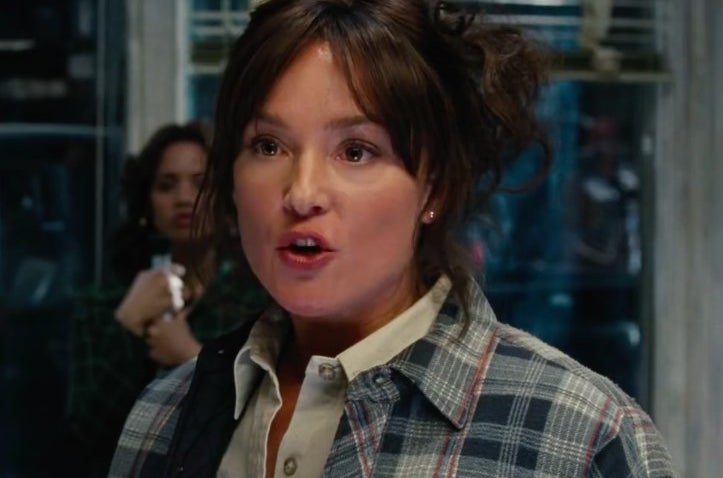
In Mumolo’s version, there is no Trudy character. But in Russell’s, Trudy and Rudy — by the way, he named the character Trudy knowing Rudy’s name was Rudy — meet through a dating service for widows and widowers. (Rudy is neither.) They fall in love immediately, and Joy asks Trudy to invest her considerable (it appears) money in her mop startup. In quizzing Joy to see whether she is worthy of her money, Rossellini-as-Trudy is asked to deliver impossible, tonally inscrutable lines of dialogue about her "late husband Morris" and "Morris's four questions of financial worthiness."
"You are in a room and there is a gun on the table and the only other person is an adversary in commerce,” Trudy says with a straight face. “Only one of you can prevail, yet you will have protected your business and Morris's money. Do you pick up the gun, Joy?" Is she an escapee from a mental institution? Is she Dorothy from Blue Velvet after years in the witness protection program? It's impossible to discern.
But Röhm's Peggy — another character who exists only in Russell's Joy — is even more mystifying. From the start, she looms over Joy half in awe and half brimming with resentment, both of which manifest themselves in seething bitterness. After we see her prince-yearning younger self, the first time adult Peggy appears soon into Joy, she yells, "Nice job, Joy, nice job!" And then, in front of Joy's kids, "I wasn't stupid enough to get into a bad marriage and have a couple of kids."
Peggy is jealous, overly identifies with Rudy, and sees herself as a thwarted inventor. She succeeds in dragging down every scene she appears in. (Röhm was also in Russell's American Hustle.) The combination of Trudy and Peggy seems to be trying to get at a wicked stepmother/stepsister Cinderella theme, but if that is the aim, Joy doesn't get there either.
5. There's a voiceover that literally just won’t die.
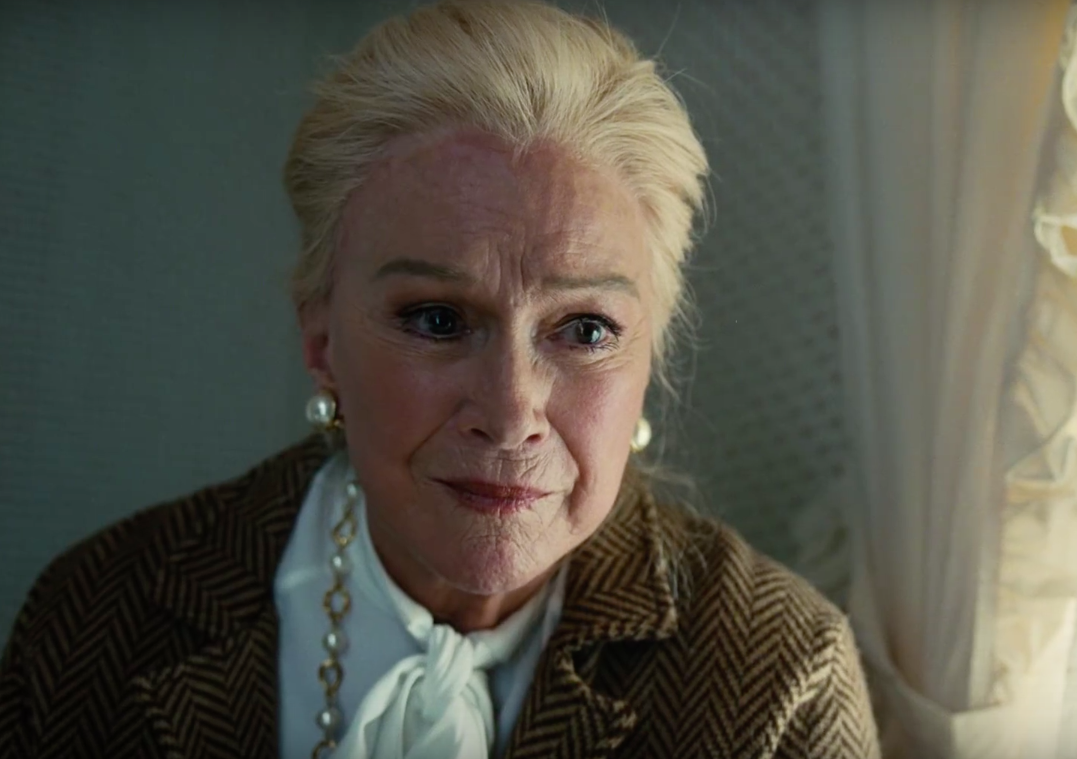
Joy is narrated in voiceover by Mimi, Joy's grandmother, played by Diane Ladd. If every character in the movie — except for Joy — is a collection of quirks, Mimi's abiding one is to deliver homiletic edicts about Joy's destiny. At the film's beginning, she addresses young Joy, and tells her, "You are going to grow up and be a strong, smart young woman, go to school, meet a fine young man, have beautiful children of your own, and you're going to build wonderful things like you do in your room." To the audience, she then says, "What happens to this girl's dream? Watch this."
There was no voiceover and no Mimi character at all in Mumolo's script. There was no Mimi to say to a dispirited Joy after her mop didn't sell on QVC, "You were born to be the unanxious presence in the room. And I know that I'm going to live to see you grow up to be the successful matriarch you were born to be." (That Mimi dies and still continues on as a narrator, taking us all the way to the end, is par for the course.)
Russell is an auteur, and he generally likes to write his own movies, even if they didn't originate with him. That was the inevitable outcome of Joy with him as the director. In the months before its release, Joy was on every Academy Awards predictions list in the major categories: Best Picture, Best Director, Best Original Screenplay, Best Supporting Actor (for Cooper and for De Niro), and Best Actress. And why wouldn't it be? In recent years, Russell has directed The Fighter (2010), Silver Linings Playbook (2012), and American Hustle (2013), all of which have drawn prodigious nominations and some victories too (including a Best Actress win for Lawrence’s performance in Silver Linings Playbook). With all of the hype, it was thought, maybe Joy could even bring Russell his first Best Picture win.
Then Joy began to screen for critics, entertainment journalists, and awards gurus — and it quickly fell off of those lists. (Lawrence is its sole Oscar nominee.)
The movie's complicated journey to the screen may seem like a fever dream at this point — that is how it feels to watch the finished product as well. And if anyone involved with Joy thinks it is ironic that a script about a woman who almost had her business stolen from her was taken away from a female screenwriter, they have not said that out loud. But maybe someone is thinking it.
Or maybe they're thinking, as Clarinda from Joy's soap opera says as the film opens, "It doesn't make sense. I don't know how something like this happened."
